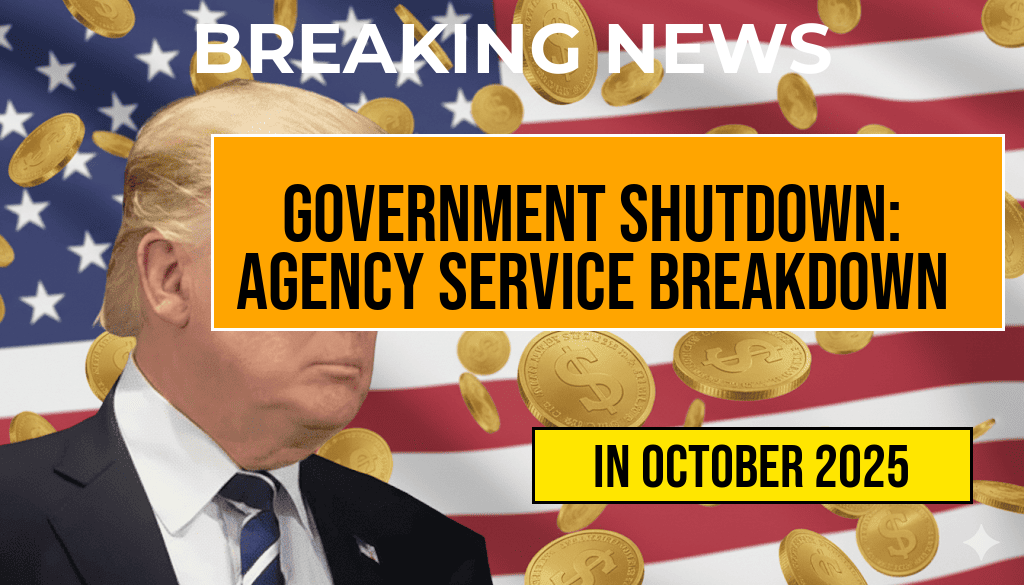The federal government has officially entered a shutdown after congressional negotiations failed to reach a funding agreement by the midnight deadline. Thousands of federal employees face furloughs, and many government services operate at reduced capacity or cease entirely. While essential services like national security, public safety, and critical health functions continue to operate, a detailed breakdown reveals significant impacts across various agencies. This shutdown underscores the delicate balance between legislative priorities and the operational needs of the federal government, prompting widespread concern among Americans reliant on these services.
Impacts on Federal Agencies and Services
Essential Services Maintain Operations
During a government shutdown, agencies designated as performing essential functions are expected to continue their operations. These typically include activities related to national security, public safety, and health. Employees involved in these areas are generally required to work without immediate pay, although they are expected to receive back pay once funding is restored.
Non-Essential Services Suspend
Services classified as non-essential are halted, leading to temporary closures, layoffs, or reduced services. This includes many administrative functions, public-facing offices, and programs that depend on discretionary funding. The shutdown’s duration determines the extent of disruptions across the country.
Agency-by-Agency Breakdown of Funding and Operations
Social Security Administration
| Service | Status | Notes |
|---|---|---|
| Retirement and Disability Payments | Continues | Payments are processed as usual, ensuring beneficiaries receive benefits without interruption. |
| Customer Service and Local Office Operations | Limited | In-person services and local office operations are temporarily suspended; beneficiaries are encouraged to use online resources. |
| Application Processing | Delayed | New applications and inquiries face processing delays due to staffing reductions. |
Internal Revenue Service (IRS)
- Tax Processing and Refunds: Processing of individual and business tax returns is suspended, but critical operations like fraud detection and enforcement continue.
- Customer Support: Phone lines and online support are limited, leading to increased wait times and delays in assistance.
- Filing Deadlines: The deadline for filing federal taxes remains unchanged, but assistance options are reduced.
Department of Defense (DoD)
As a core component of national security, the DoD continues operations, though non-essential activities are scaled back. Some civilian employees are furloughed, and defense contractors face uncertainties depending on contract stipulations.
- Military Personnel: Service members continue to perform their duties without interruption.
- Civilian Workforce: Many civilian employees are furloughed, impacting administrative and support functions.
- Research and Development: Most non-essential research programs are halted.
Transportation Security Administration (TSA)
The TSA remains operational at airports nationwide, ensuring continued air travel safety. However, some ancillary services, such as passenger assistance and administrative functions, face disruptions due to staffing shortages or furloughs.
Other Key Agencies and Their Statuses
| Agency | Essential Services | Non-Essential Services |
|---|---|---|
| Environmental Protection Agency (EPA) | Limited emergency response and compliance enforcement | Most inspections, grants, and non-critical activities suspended |
| Federal Emergency Management Agency (FEMA) | Continued disaster response and preparedness operations | Non-urgent planning and administrative work paused |
| U.S. Postal Service | Operational as an independent entity | No significant disruptions expected |
Financial and Public Implications
The immediate consequence of the shutdown is the disruption of services for millions of Americans relying on federal programs. Many federal employees face unpaid leave, which could ripple through local economies. The suspension of non-essential services also hampers economic activity, delays processing times, and creates uncertainty for individuals and businesses awaiting government decisions or support.
Standard federal benefits like Social Security payments continue, but some agencies warn of delays in processing new claims or inquiries. The shutdown also raises questions about the longer-term financial stability of programs that depend on uninterrupted funding, emphasizing the urgency of congressional action to restore full funding.
Legal and Political Context
The shutdown stems from a failure of congressional leaders to agree on a funding package, often tied to broader political negotiations on budget priorities. Historically, shutdowns have fluctuated in duration and impact, but they typically underscore deeper partisan divisions. Lawmakers are expected to revisit negotiations soon, aiming to pass a temporary funding measure or full budget resolution to end the impasse.
For additional context on government shutdown procedures and history, visit Wikipedia’s article on U.S. federal government shutdowns.
Frequently Asked Questions
What does a government shutdown mean for Social Security beneficiaries?
A government shutdown may temporarily halt certain Social Security operations, but benefits will generally continue to be paid. However, some administrative services and customer support may experience delays during the shutdown period.
Will the IRS still process tax returns and refunds during a shutdown?
During a government shutdown, most IRS operations, including processing tax returns and issuing refunds, are typically suspended unless Congress authorizes continued funding for specific activities.
How does the shutdown affect defense and military services?
The Defense department continues to operate during a shutdown for essential functions related to national security, but many non-essential activities and administrative services may be temporarily halted.
Are TSA security screenings still operational during a government shutdown?
Yes, TSA security screenings at airports generally continue during a government shutdown, as these are considered essential services necessary to maintain national transportation security.
What services are affected by a government shutdown outside of federal agencies?
Services outside of essential federal operations, such as passport processing, benefits claims, and grant programs, may be delayed or suspended during a shutdown until funding is restored.

Leave a Reply